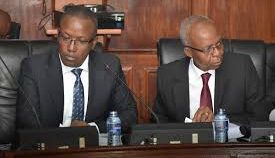The African Union has called for the mass withdrawal of member states from the International Criminal Court (ICC).
However, the resolution is non-binding, with Nigeria and Senegal opposing a withdrawal.
South Africa and Burundi have already decided to withdraw, accusing the ICC of undermining their sovereignty and unfairly targeting Africans.
The ICC denies the allegation, insisting it is pursuing justice for victims of war crimes in Africa.
The AU took the decision on Tuesday following a divisive debate at its annual heads of state of summit in Addis Ababa.
Part of the resolution also said the AU would hold talks with the UN Security Council to push for the ICC to be reformed, our correspondent adds.
Sudan’s President Omar al-Bashir, who is wanted by the court on charges of genocide in Darfur, was at the summit.
In 2015, a South African court criticised President Jacob Zuma’s government for failing to arrest Mr Bashir when he attended an AU meeting in the main city, Johannesburg.
The government later announced that it was withdrawing from the ICC because it did not want to execute arrest warrants which would lead to “regime change”.
A total of 34 African states are signatories to the Rome Statute, which set up the ICC, which makes almost a third of the member states. A withdrawal by a large number of African states would cripple a court that has yet to fulfil hopes that it would ensure perpetrators of war crimes and genocide never go unpunished.
Sources at the AU secretariat said the summit proposed a co-ordinated withdrawal unless the ICC was reformed.
It included a call for “regionalisation” of international law, a reference to proposals for an African war crimes court.
Three African states – South Africa, Gambia and Burundi – signalled last year their intention to quit what is the world’s first permanent global war crimes court.
The ICC, which is 15 years old this year, has only ever charged Africans, including the presidents of Kenya and Sudan, although it has procedures open at earlier stages dealing with crimes in Eastern Europe, the Middle East and South America.





















